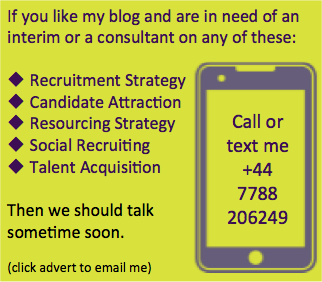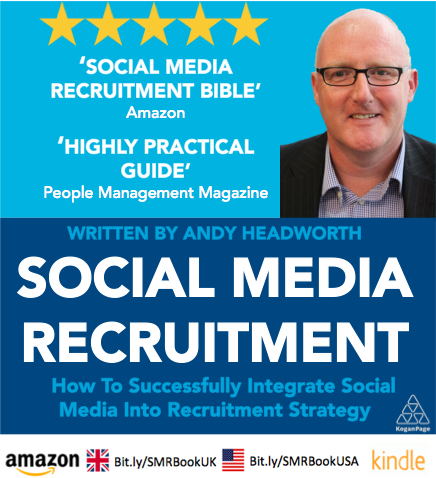5 Ways HR And Recruiting Could Buck The Trend
Each year we see different trends - it could be beards, hairstyles, clothes, music, TV shows, films etc. They soon disappear to be replaced by the next one, and the cycle is seemingly endless. The same could be said for HR and recruiting to a certain extent, with different CV styles, interview techniques and website design being just some of the things that regularly change with time. Some trends are (relatively) short lived (remember SecondLife?) and others last a longer period of time and generate entire business sectors, such as video interviewing platforms. Even then, they are not adopted by everyone.
But, when things go mainstream it is different. Well it should be!
Social media and mobile are perfect examples - they are well and truly fixed in every aspect of our everyday lives, including the workplace. Everyone adopts or embraces new things at different speeds, so while companies in the consumer world are now fully mobile and have social media integrated for marketing, purchasing products, customer services and branding etc, the recruitment industry are still lagging behind (with a few exceptions of course).
Nothing new there then, you may say.
However, I believe this is an issue that will cause more problems in HR and recruiting teams going forward. The lack of foresight and speed of change is seriously affecting the ability of companies to attract and recruit the talent they need for their business.
A perfect example is Facebook. Amazingly, many companies still ban access to it in the workplace for different reasons, yet all an employee has to do to get round the ban is access it via their mobile device instead, making the ban ineffective. Facebook is the worlds largest engaged social network with 1.5billion people using every month, including a good percentage of your workforce. Companies complain about employee engagement and communication, so why not embrace a platform that is already used by many of your employees, to engage and communicate with them? Instead of seeing a potential solution, companies prefer to see the negatives and subsequently put blocks in the way. Well in 2016, I think after successful trials at companies like RBS, Facebook at Work (think of it as an internal social network sitting on Facebook) will start to become more common. Why not consider Facebook for recruiting at your company?
As a consultant I get the opportunity to work with a wide range of organisations, and talk to many more at events and conferences. In my experiences here are five common examples where companies could make improvements, by taking some time to think about their recruiting challenges from a different perspective than they currently are:
- Candidate expectations
People of all ages use their mobiles every day for communicating, checking messages, texting, Facebook, web browsing, purchasing items, playing games, listening to music, watching videos etc. So why wouldn’t they then use them to search for and apply for jobs? We now all expect to access any site on a mobile device, by default. It is just the normal thing to do isn’t it? So why would applicants and candidates be any different?
It is shocking that this should still be a problem for company career sites and the associated online recruitment process - mobile should be a must have not aspirational. Don’t wait any longer (see no.5). - ATS governance
Recruiters often have to work to their technology, not the other way around. If an organisation has an ATS, recruitment system or (if they are lucky) a CRM in place as their recruitment management tool, then it makes sense that the recruiters will have to manage applicants and candidates through that process. Without this adherence to process, then there would be no meaningful recruitment data available to the business.
But when the recruitment system is broken / not fit for purpose / poorly configured / out of date or just simply crap, it leaves recruiters in a difficult position. They know they will get into trouble for not using the recruitment system, but equally know the only way to source, engage and communicate with their target audience is to go outside it and use different methods such as social recruiting. The better recruiters do what has to be done and suffer the wrist-slapping as a consequence. The hiring managers don’t care where the candidates come from, as long as they get found, and you could argue they are people to keep happy in most businesses. Maybe it is time reconsider your recruiting technology? - Speed of action
We all live in an ‘always-on’ world with a decreasing tolerance of delays and attention spans. In other words we want everything immediately. I am totally guilty of this if I have cause to complain or have an issue online - I search out the Twitter or Facebook of the company and message them accordingly. I then expect an answer very quickly (or at the least an acknowledgement). Don’t you, when you do complain via social media?
Some would say that is unreasonable, but if companies have social accounts, they should be social and respond in a timely manner.
So what about companies who have social media accounts they are using for talent attraction and engagement - how many have configured the notifications, and have team members that are able to respond in a timely manner? Less than you think, in my experiences working with companies. You can set up all the social networks to send email and push notifications immediately when people interact with you, so their should be no excuse for responding to people. - Transparency
You can’t hide anymore online just because you are not on social media as a company (in HR or recruiting). Your brand. company, people and processes are laid bare to anyone that has a social media account and/or a mobile phone - including your own employees. Glassdoor has seen to that. Just because your presence on social sites may be negligible, it doesn’t stop people discussing and sharing information, website links, photos or videos with their own networks. Hopefully it is good things, but not necessarily all the time.
The great thing here is that you can turn this to your advantage and be transparent with content and information - especially things like what it is like to work at your company, or stories about your employees. If you haven’t already done so, check out what is being said about your company on Glassdoor and other social networks, and make sure you respond accordingly - especially if it happens to be negative. - Procrastination
Talking about doing something is great, taking the next step to make it happen is another. The issue is that instead of getting to the delivery phase, too many people have another meeting, and another and another……… Social Media and mobile sit firmly under this heading.
Another example - how about using the platforms where candidates are active every day, such as instant messaging platforms like Messenger or WhatsApp as well as SMS? Surely it makes good business sense to do so instead of delaying or postponing by talking about it? Maybe you should even consider how you run your meetings?
There is only five here, but I am sure you would have more examples where your company (or others) could improve things around recruiting processes and actions. I have highlighted social and mobile because I believe they should be an intrinsic part of a recruitment strategy. Different people will use different social platforms for different reasons - some will use one or two some a lot more than that, depending on their audiences. But whatever you choose, make the decision based on where your target audience is not where you want it to be because it is more convenient for you.
If you want to discuss areas of this post, check out a short video of what we do or need help with regards to improving your resourcing strategy or recruitment process, just send me an email and let’s have a chat.
And remember, if you like this post, don’t forget to subscribe to Sirona Says blog to ensure you don’t miss the weekly posts. And if you haven’t got your copy yet, don’t forget to buy a copy of my new book.











